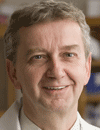Other Track AgendasEpigenetics | miRNA and Non-coding RNA | New Applications in qPCR | Next-Gen Sequencing |

Thursday, 9 May 201309:30 |  | Keynote Presentation 5-Hydroxymethylcytosine in Development and Cancer
Gerd Pfeifer, Professor, City of Hope Medical Center, United States of America
5-hydroxymethylcytosine is a modified DNA base created by enzymatic oxidation of 5-methylcytosine. Studies of 5-hydroxymethylcytosine in cancer and in the mouse brain are beginning to provide information on the specific distribution and potential function of this novel DNA base. |
| 10:30 | Coffee Break and Networking in the Exhibition Hall | |
Chromatin Mechanism in Epigenetic Marking |
| | 11:15 | Population Epigenomics of the Drosophila Y Chromosome
Bernardo Lemos, Assistant Professor, Harvard School Of Public Health, United States of America
We have recently uncovered Y-linked regulatory variation: the quantitative effects that polymorphic tracts of Y-linked chromatin exert on autosomal and X-linked genes. Here we combine several datasets to provide insights into the mechanisms by which Y chromosomes modulate epigenetic states. | 11:45 | Reading and Writing Histone Marks by the MYST-ING Tumor Suppressor Complexes
Jacques Cote, Professor, Laval University, Canada
I will present our recent work on human histone acetyltransferase complexes and how cross-talks between histone marks occurs through different subunits of these complexes to regulate gene expression, genome stability and cell fate. | 12:15 | Lunch Break and Networking in Exhibition Hall | 13:30 | Poster Viewing Session | 14:15 | The Histone Demethylase LSD1/KDM1 is a Master Regulator of the Stem Cell Fate
David Katz, Assistant Professor, Emory University, United States of America
Histone modifications, such as H3K4me2, may function in maintaining transcriptional states through cell division. This talk will focus on the role of the histone demethylase LSD1 in mammalian stem cell populations reprogramming H3K4me2 to enable changes in cell fate. | 14:45 | Targeting Leukemia Oncogene Expression with Bromodomain Inhibitors
Christopher Ott, Research Fellow, Harvard School of Public Health, United States of America
Bromodomain inhibitors disrupt the association of chromatin-binding proteins with transcriptionally active regions of the genome. We have developed JQ1, an inhibitor of BET bromodomains; JQ1 induces a dramatic and selective decrease in oncogene expression in leukemia cells. | 15:15 | Coffee Break and Networking in the Exhibition Hall | 16:00 | Chemical Modulation of Chromatin Structure
Jun Qi, Lead Scientist, Dana Farber Cancer Institute, United States of America
This presentation will describe the development of chemical modulators of lysine acetylation for cancer research and cancer medicine. | |
Nuclear Dynamics and Long-range Control |
| | 16:30 | Noncoding RNAs in Chromatin Regulation
Claes Wahlestedt, Professor, University Of Miami, United States of America
Much of the mammalian genome is transcribed into long and small noncoding RNAs of different categories. This lecture will primarily be concerned with long noncoding RNAs which regulate gene expression through several distinct mechanisms involving chromatin regulator protein complexes. Implications for chromatin related small molecule drug discovery will be discussed. | 17:00 | The Epigenetics of Genomic Stability and DNA Repair
Brendan Price, Division of Genome Stability and DNA Repair, Dana Farber Cancer Institute, United States of America
DNA repair requires remodeling of the local chromatin architecture. Chromatin remodeling at sites of DNA damage requires both dynamic regulation of histone modifications and exchange of histone variants. These epigenetic changes then function together to direct assembly of a chromatin template which is an efficient substrate for the DNA repair machinery. | 17:45 | Round Table Discussions in the Exhibition Hall | 19:00 | Close of Day One |
Friday, 10 May 201309:00 |  | Keynote Presentation CANCELLED - Histone Mimicry and Antiviral Response
Alexander Tarakhovsky, Professor, Rockefeller University, United States of America
In my presentation I will discuss histone mimicry and its potential physiological significance. Histone mimicry describes a phenomenon of structural and functional similarity between the N-terminal domain of histones and the non-histone proteins of distinct origin. I will discuss how the presence of histone mimics in mammalian and viral proteins contributes to the regulation of gene expression. I will also discuss how synthetic compounds that mimic the histone function can regulate gene expression in model systems. |
| |
Epigenetic Processes in Disease, Epigenomics |
| | 10:00 | Epigenomics of Metabolism in Health and Disease
Evan Rosen, Principal Investigator, Harvard University, United States of America
This talk will discuss how epigenetic mechanisms affect the differentiation and physiology of metabolic tissues, with an emphasis on adipose tissue, and will further explore a role for epigenetics in metabolic diseases like obesity and type 2 diabetes. | 10:30 | Coffee Break and Networking in the Exhibition Hall | 11:15 | Methylome-wide Association Studies in 1500 Case-control Samples Using MBD-seq
Karolina Aberg, Research Assistant Professor, Virginia Commonwealth University, United States of America
The use of methyl-CpG binding domain (MBD) protein-enriched genome sequencing (MBD-seq) as a screening tool for methylome-wide association studies (MWAS). Demonstration in 1500 individuals with targeted follow-up of top findings in 1100 independent individuals. | 11:45 | Molecular Pathological Epidemiology (MPE): Integrative Science of Environment, Host and Epigenetics
Shuji Ogino, Associate Professor, Dana Farber Cancer Institute, United States of America
Molecular Pathological Epidemiology (MPE) is an emerging integrative science, and the power and promise of MPE as both molecular and population-level science have increasingly been recognized. MPE considers environment, host and disease epigenetics to provide insights into pathogenesis. | 12:15 | Lunch Break and Networking in Exhibition Hall | 13:30 | Poster Viewing Session | |
Epigenetic Re-programming, Stem Cells and Genome Dynamics |
| | 14:15 | DNA Methylation in Reprogramming and Differentiation of Pluripotent Stem Cells
Guoping Fan, Professor, University of California Los Angeles, United States of America
We will highlight regulation of DNA methylation during neural cell differentiation and upon somatic cell reprogramming via the Yamanaka protocol. | 14:45 | The PcG Gene Sfmbt2 Regulates Development of Extraembryonic Stem Cells and Tissues
Susannah Varmuza, Professor, University of Toronto, Canada
Knockdown of Sfmbt2 in preimplantation embryos impairs trophoblast stem cell derivation, and knockout of the paternal allele leads to reduced placenta/yolk sac development and embryonic death. | 15:15 | Coffee Break and Networking in the Exhibition Hall | 15:45 | Epigenetic Variability Within and Among Pluripotent and Differentiated Cell Types
Louise Laurent, Associate Professor, University of California-San Diego, United States of America
We will present findings on normal and abnormal DNA methylation patterns in human pluripotent stem cells and their differentiated derivatives, in the context of relevant tissue-derived cells. | 16:45 | Close of Conference |
|

 Add to Calendar ▼2013-05-09 00:00:002013-05-10 00:00:00Europe/LondonEpigeneticsSELECTBIOenquiries@selectbiosciences.com
Add to Calendar ▼2013-05-09 00:00:002013-05-10 00:00:00Europe/LondonEpigeneticsSELECTBIOenquiries@selectbiosciences.com